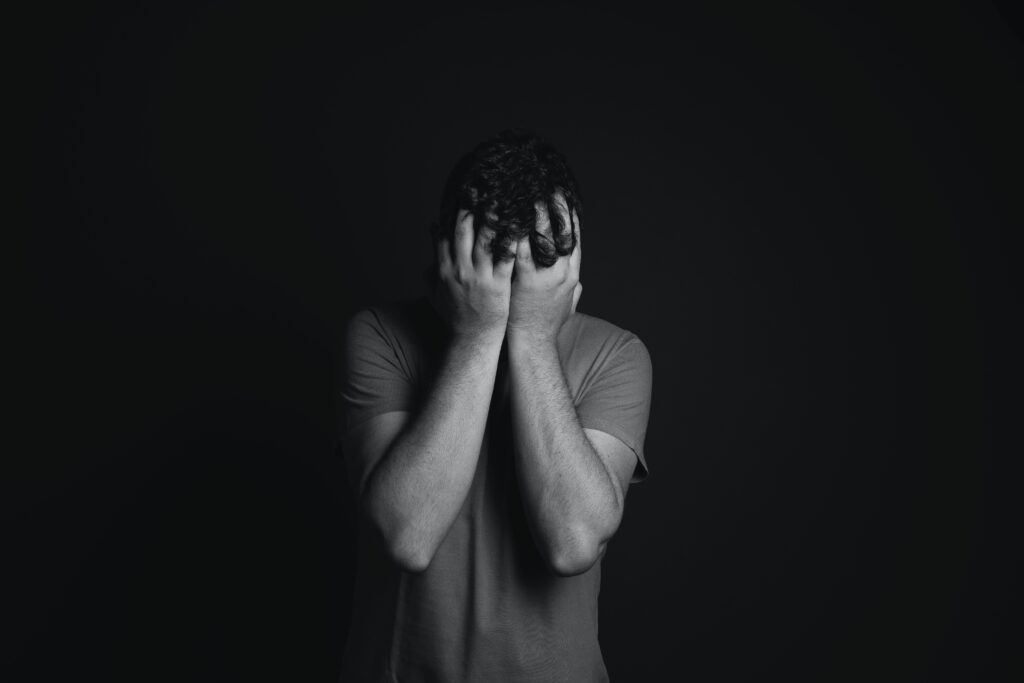10 signs you’re living with depression

Despite how depression is portrayed on the media and social media, this condition can be hard to identify in real life. Depression, just like many other conditions, runs on a spectrum that goes from mild to severe.
Depending on where in the spectrum a person is, depression may be difficult to pinpoint in everyday life. Depression also tends to overlap with conditions such as anhedonia, insomnia, anxiety, and others which may cause it to be undiagnosed or misdiagnosed.
While this article is only for educational and entertainment purposes only, we have written down twelve of the most common signs that you may be living with depression.
This article is not meant as a tool to self-diagnose or self-treat. If you suspect that you or a loved one is suffering from depression we suggest that you contact a mental health professional and get help.
And now, here are the signs you may be living with depression.
1. The Cognitive Triad (Negative Thoughts)
Have you experienced feelings of helplessness, hopelessness, and worthlessness that just won’t go away?
Experts call this the Cognitive Triad of Depression. According to an article written by Dr. Saul Mcleod, MRes, Ph.D., a psychologist with over 17 years of experience, the Cognitive Triad “are forms of negative thinking that are typical of individuals with depression: namely negative thoughts about the self, the world, and the future”.
As these negative thoughts intertwine they make your outlook more negative. In an interview with NDTV news channel, psychiatrist Dr. Sanjay Chugh explained that when the person with depression looks into the future they see it as dark and bleak as the present which makes them hopeless.
Next, the person begins to compare themselves to others. In seeing that they cannot meet their perceived standards they start feeling inferior which creates feelings of worthlessness. Having these bleak outlooks on life and themselves begins to make them feel hopeless in turn because they cannot see a way out of it.
2. Loss of interest
Along with the feelings of the Cognitive Triad come to a variety of other side effects including loss of interest. This loss of interest is called anhedonia. Although not everyone with depression suffers from anhedonia, it is still considered one of the telltale signs of depression.
According to a Healthline article called “What is Anhedonia?”, the condition inhibits you from feeling pleasure in what you used to like, social situations, and situations in general. Giving you the need to retreat from society, friends, and family, which can then exacerbate feelings of loneliness and worthlessness. But, it can also become physical.
When it comes to physical anhedonia, the article states that it is the “inability to feel tactile pleasures such as eating, touching, or sex.”
3. Eating too much or too little

Have you suddenly found yourself having too much to eat or have no appetite at all?
Depending on your natural response to stress, depression can make you change your eating habits by making you eat too much or too little.
An EveryDay Health article on depression’s effect on appetite states that loss of appetite can be a direct result of fatigue, lack of pleasure from activities, and nausea caused by depression. On the other hand, an increase in appetite can be caused by feelings of sadness and worthlessness.
Causing you to eat in order to fill a void and activate the areas of the brain that cause pleasure to stave the sadness away. Loss or gain of appetite like this can directly result in sudden weight changes.
4. Sleeping problems
Are you having trouble sleeping or sleeping too much? Are you waking up at odd hours of the night with no explanation?
Depression and sleeping go hand in hand. According to the Sleep Foundation, depression and sleep have a bidirectional relationship. This means that changes in sleep cycles can contribute to depression, and depression can contribute to sleeping problems.
The Sleep Foundation states that insomnia (lack of sleep), hypersomnia (too much sleep), and obstructive sleep apnea are sleep problems associated with or caused by depression, with insomnia being the most common. Although you can go back and forth between not sleeping enough and sleeping too much in a depressive episode.
This can cause other problems like fatigue, anxiety, aches, uncontrollable emotions, and others due to the resting, brain, and bodily functions being altered because of sleep problems.
5. Fatigue
Fatigue is one of the symptoms related to depression. It is defined as the extreme tiredness or loss of energy caused by mental or physical exertion or illness. But, in an article called “Fatigue as a Residual Symptom of Depression” from the National Center of Biomedical Information (NCBI), Dr. Mauricio Fava, MD expressed that he feels fatigue is more than that.
“We see apathy and considerable emotional disturbance occurring as a consequence of fatigue”, stated Dr. Fava, “We have also seen high rates of diminished focus, word-finding difficulties, and recall problems in fatigued patients with major depressive disorder (MDD)”.
Dr. Fava, Director of the Depression Clinical and Research Program at the Massachusetts General Hospital, continues by mentioning that in recent studies there are “three distinct categories of fatigue that commonly occur within a population of MDD patients: physical, cognitive, and emotional symptoms”.
The physical symptoms experienced because of fatigue range from lack of energy and weakness to sleep problems. The cognitive (mental symptoms) include but are not limited to lack of concentration, focus, and decreased mental endurance. The emotional symptoms range from disinterest, lack of motivation to feeling flat.
6. Trouble concentrating

Have you noticed your ability to concentrate and your memory slipping more often than before? This could be a sign of depression.
As mentioned, there are cognitive symptoms that depression has on people who suffer from it. This is because depression changes your brain.
In an article written for Harvard Health Publishing, James Cartreine, Ph.D., a clinical psychologist and instructor in Psychiatry at Harvard Medical School, states that “depression can actually change your ability to think.”
“It can impair your attention and memory, as well as your information processing and decision-making skills”, he writes and continues, “It can also lower your cognitive flexibility (the ability to adapt your goals and strategies to changing situations) and executive functioning (the ability to take all the steps to get something done)”.
7. Anxiety
Although anxiety and depression have similar symptoms, they are not the same. Both have their own unique causes and symptoms but we can’t deny that many people tend to suffer from both.
It is common to see them both together although anxiety is a high-energy state and depression is a low-energy state. But how can a person suffer from both high energy state and low-energy state conditions?
In an article written for the Hart Grove Hospital Behavioural Health System, it is stated that the angst and the failure you may feel when worrying about something, are two of the doorways depression uses to enter.
According to the article, the chance of getting depression is higher if you already suffer from an anxiety disorder. “Nearly half of those with major depression also suffer from severe and persistent anxiety”, the article states.
Depression can also trigger anxiety. “People who are depressed often feel anxious and worried”, says the article, “One can easily trigger the other, with anxiety often preceding depression.”
8. Irritability and Anger (Uncontrollable Emotions)
Do you find yourself becoming easily irritable or angered even over the smallest things? This could be a sign of depression.
People usually think of sadness as a catch-all for depression but that couldn’t be farther from the truth. For men, in particular, depression manifests as irritability and anger in most cases.
Children and teens also tend to experience irritability when suffering from depression.
In an article written for NPR called “If you’re often angry and irritable you may be depressed”, it is stated that in the Diagnostic and Statistical Manual of Mental Disorders, for some reason, anger and irritability are listed as symptoms of depression for children and teens but not for adults.
This could be a reason why so many physicians often misdiagnose depression when a person shows anger or irritability instead of sadness, melancholy, or hopelessness.
According to the article, if you are “picking fights, being irritable, critical, mean, are quick to anger or have sudden bursts of anger (or anger attacks) such as screaming, throwing things and getting physical for small things” you may be suffering from depression.
9. Aches and Pains

When it comes to depression, aches and pains can be caused by not getting enough sleep or getting too much sleep. It could also be caused by the fatigue or anxiety experienced with depression. This can be identified once you have been diagnosed with depression.
But what happens when you aren’t diagnosed and are suffering from aches and pains? According to Web MD, it is more likely than not that the doctor will find no obvious cause for the pains and not diagnose the patient.
This is one of the problems with more physical manifestations of depression. Doctors often look for emotional or mental signs or symptoms of depression and completely look over the physical ones. Nevertheless, physical depression does exist.
If you have unexplainable aches and pains, that may be a sign of depression and we recommend that you get screened for depression.
10. Reckless behavior
Are you seeking unhealthy ways outside of yourself to deal with your intense emotions?
Intense emotions are a major characteristic of depression although it isn’t necessarily experienced by all who suffer from depression. But, for those who do, it may drive them to try to seek relief from their pain by indulging in risky behavior.
In an article written for Web MD, called “Depression and Risky Behavior”, sometimes depression pushes the person to “turn to alcohol, drugs, unsafe sex, cutting and others” as a way to quench or put a temporary stop to their pain.
Depression is a complicated subject so it is recommended that you seek out your own mental health professional for treatment and advice. If you would like to read more about the points discussed in this article, feel free to look into the references listed below.
Did you identify with any of these points? Let us know down in the comments if you did.

References:
Bruce, D. F. (2019, September 17). Signs of clinical depression: Symptoms to watch for. WebMD. Retrieved from https://www.webmd.com/depression/guide/detecting-depression.
The Healthline Editorial Team. (2019, March 21). 9 depression symptoms to look out for. Healthline. Retrieved from https://www.healthline.com/health/depression/recognizing-symptoms#getting-help.
Smith, M., Robinson, L., & Segal, J. (2021, August 11). Depression symptoms and warning signs. HelpGuide.org. Retrieved from https://www.helpguide.org/articles/depression/depression-symptoms-and-warning-signs.htm.
Cited:
Arora, G. (2020, June 16). Hopelessness, helplessness and worthlessness: Know all the warning signs of depression from our expert. NDTV.com. Retrieved from https://www.ndtv.com/health/hopelessness-helplessness-and-worthlessness-warning-signs-of-depression-from-expert-2247061.
Iliades, C. (2012, September 10). Depression’s effect on your appetite – major depression resource center – everyday health. EverydayHealth.com. Retrieved from https://www.everydayhealth.com/hs/major-depression/depressions-effect-on-appetite/.
Cartreine, J. (2016, May 6). More than sad: Depression affects your ability to think. Harvard Health. Retrieved from https://www.health.harvard.edu/blog/sad-depression-affects-ability-think-201605069551.
Depression and sleep. Sleep Foundation. (2021, May 19). Retrieved from https://www.sleepfoundation.org/mental-health/depression-and-sleep.
Greenfieldboyce, N. (2019, February 4). If you’re often angry or irritable, you may be depressed. NPR. Retrieved from https://www.npr.org/sections/health-shots/2019/02/04/689747637/if-youre-often-angry-or-irritable-you-may-be-depressed.
Kam, K. (2011, June 23). Depression and risky behavior. WebMD. Retrieved from https://www.webmd.com/depression/features/depression-and-risky-behavior.
Kirchheimer, S. (2004, July 20). Muscle aches and other body pains may signal depression. WebMD. Retrieved from https://www.webmd.com/depression/news/20040720/body-aches-may-signal-depression.
Mcleod, S. (1970, January 1). Cognitive behavioral therapy. Cognitive Behavioral Therapy | CBT | Simply Psychology. Retrieved from https://www.simplypsychology.org/cognitive-therapy.html.
Purdie, J. (2018, September 17). Anhedonia: Symptoms, treatment, and more. Healthline. Retrieved from https://www.healthline.com/health/depression/anhedonia.
Targum, S. D., & Fava, M. (2011, October). Fatigue as a residual symptom of depression. Innovations in clinical neuroscience. Retrieved from https://www.ncbi.nlm.nih.gov/pmc/articles/PMC3225130/.
Tjornehoj, T. (2020, October 6). The relationship between anxiety and depression. Hartgrove Behavioral Health System. Retrieved from https://www.hartgrovehospital.com/relationship-anxiety-depression/.



Responses